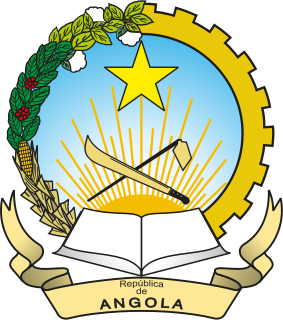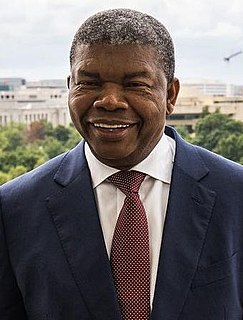| |||||
| Centuries: | |||||
|---|---|---|---|---|---|
| Decades: | |||||
| See also: | List of years in Angola | ||||
Events in the year 2018 in Angola .
| |||||
| Centuries: | |||||
|---|---|---|---|---|---|
| Decades: | |||||
| See also: | List of years in Angola | ||||
Events in the year 2018 in Angola .
Iris Angola, the country's only gay rights lobby group established in 2013, was given legal status in June. Due to the lack of recognition by the state governments, members of this group had faced discrimination accessing health and education services. This "historic moment" allowed homosexuality rights to be defended in Angola. [1]
Over 400,000 Congolese migrants were expelled from Angola in October. President Lourenço claimed this was to reduce diamond smuggling, but was backed up with nonexistent evidence. Nonetheless, migrants were killed, looted, and forced out of the country, expressing fear and intimidation after the expulsion. [1]

Angola, officially the Republic of Angola, is a country located on the west coast of Southern Africa. It is the second-largest Lusophone (Portuguese-speaking) country in both total area and population, and is the seventh-largest country in Africa. It is bordered by Namibia to the south, the Democratic Republic of the Congo to the north, Zambia to the east, and the Atlantic Ocean to the west. Angola has an exclave province, the province of Cabinda, that borders the Republic of the Congo and the Democratic Republic of the Congo. The capital and most populous city is Luanda.

The Angolan government is composed of three branches of government: executive, legislative and judicial. For decades, political power has been concentrated in the presidency with the People's Movement for the Liberation of Angola.

The National Union for the Total Independence of Angola is the second-largest political party in Angola. Founded in 1966, UNITA fought alongside the Popular Movement for the Liberation of Angola (MPLA) in the Angolan War for Independence (1961–1975) and then against the MPLA in the ensuing civil war (1975–2002). The war was one of the most prominent Cold War proxy wars, with UNITA receiving military aid initially from People's Republic of China from 1966 until October 1975 and later from the United States and apartheid South Africa while the MPLA received support from the Soviet Union and its allies, especially Cuba.

Jonas Malheiro Savimbi was an Angolan revolutionary politician and rebel military leader who founded and led the National Union for the Total Independence of Angola (UNITA). UNITA waged a guerrilla war against Portuguese colonial rule from 1966 to 1974, then confronted the People's Movement for the Liberation of Angola during the Angolan Civil War. Savimbi was killed in a clash with government troops in 2002.
Jamba may refer to:

Cuando Cubango is a province of Angola and it has an area of 199,049km2 and a population of 534,002 in 2014. Menongue is the capital of the province. The governor of the province is José Martins, who was appointed governor in November 2021.

The Angola national football team represents Angola in men's international football and is controlled by the Angolan Football Federation. The team made its first appearance in 2006 FIFA World Cup, the team's nickname is Palancas Negras, The team is governing body of Football in Angola in the country, The team represents both FIFA and Confederation of African Football (CAF).
Jamba is a town in Angola, located in the southeastern province of Cuando Cubango, just north of the Namibian border along the Caprivi Strip.
Colonel Almerindo Jaka Jamba was an Angolan politician and former rebel leader in UNITA.
The Democratic International, also known as the Jamboree in Jamba, was a 1985 meeting of anti-Communist rebels held at the headquarters of UNITA in Jamba, Angola.
Luís Carlos Lourenço da Silva, known as Lourenço, is a former professional footballer who played as a forward.
The Archdiocese of Luanda is the oldest Roman Catholic (arch)bishopric in Angola.
The Roman Catholic Diocese of Ndalatando is a diocese located in the city of Ndalatando in the Ecclesiastical province of Malanje in Angola.

Angola has long been severely criticized for its human rights record. A 2012 report by the U.S. Department of State said, "The three most important human rights abuses [in 2012] were official corruption and impunity; limits on the freedoms of assembly, association, speech, and press; and cruel and excessive punishment, including reported cases of torture and beatings as well as unlawful killings by police and other security personnel. Other human rights abuses included: harsh and potentially life-threatening prison conditions; arbitrary arrest and detention; lengthy pretrial detention; impunity for human rights abusers; lack of judicial process and judicial inefficiency; infringements on citizens' privacy rights and forced evictions without compensation; restrictions on nongovernmental organizations; discrimination and violence against women; abuse of children; trafficking in persons; discrimination against persons with disabilities, indigenous people, and persons with HIV/AIDS; limits on workers' rights; and forced labor."
Scarpa is an Italian surname

João Manuel Gonçalves Lourenço is an Angolan politician, who has served as the president of Angola since 26 September 2017. Previously, he was Minister of Defence from 2014 to 2017. In September 2018, he became the Chairman of the People's Movement for the Liberation of Angola (MPLA), the ruling party. He was the party's Secretary-General from 1998 to 2003.
Pedro Luís Guido Scarpa was an Italian Catholic bishop who served in Angola.
Events in the year 2019 in Angola.
Events from the year 2020 in Angola.